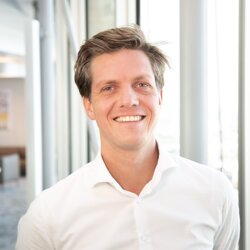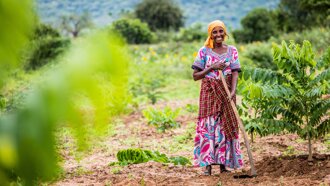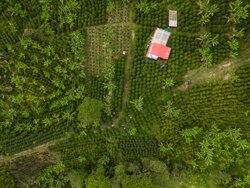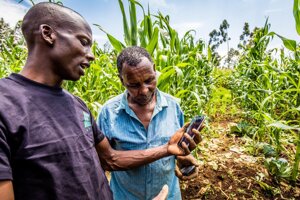'By 2030, we want to help 10 million farmers transition to agroforestry’

©Acorn
The Netherlands invested in the Geodata for Agriculture and Water (G4AW) programme for ten years. In this series, key players look back and look to the future. Jelmer van de Mortel leads project Acorn at Rabobank: 'Together with partners worldwide, we promote sustainable agriculture and contribute to reducing climate change.'
Many people will not immediately associate a bank with development cooperation. How does Rabobank contribute to the objectives of G4AW?
The 'bo' of Rabobank comes from the former Boerenleenbank (farmer lending bank in English). So helping food producers is in our DNA. We help food producers with capital to scale up and become more sustainable. We've been doing that for a long time in the Western world but it's a lot harder in developing countries. Smallholder farmers often have little or no capital to invest. And due to local conditions, the risk for outside investors is high. With Acorn, we have found a solution to this.'
What does project Acorn entail?
'We help smallholder farmers transition to sustainable agroforestry. This involves farmers growing multiple crops on the same farmland. This method has benefits on several levels. For the farmer agroforestry means more income, a more diverse diet, improved soil quality, and less vulnerability to climate change. For the region it leads to greater food security, better protected harvests, and greater biodiversity among other things. And globally agroforestry offers the opportunity to store a lot of CO2 in biomass in the short term.'

©Acorn
How do you solve the issues of financing and risk?
'This is where satellite data and the voluntary carbon market play a crucial role. The voluntary carbon market works like this: a company, for example a software giant or an airline, wants to offset its CO2 emissions. It can do so by buying carbon removal units. Farmers who plant trees can claim the money from those units. But then they have to be able to prove how much CO2 they remove from the air. That's where satellite data comes in. Satellite data provides objective measurements and therefore certainty. That makes it a lot easier to find investors willing to pre-finance. Indeed: without satellite data, Acorn would not have been financially viable.'
With similar projects there is the question of how much money actually reaches the farmers. You must get that question regularly too?
'That's right. For example, if Microsoft pays forty euros for one carbon removal unit four euros of this goes to the partner who runs the project locally. Four euros goes to us. And 32 euros, eighty per cent in other words, goes to the farmer. If a farmer has insufficient money to pre-finance tree planting, there are several financiers who can play a role in this. These include the US, German and UK governments, as well as private investors. They get their money back in instalments from the farmers’ financial returns.'

©Acorn
In an earlier interview you called Acorn 'pioneering'. What do you mean by this?
'Our methodology has not been applied on such a large scale before. We had to get buyers of credits, local farmers, financiers, and our own organisation all on the same page. With the method of financing - through farmers' revenues - we broke through usual market principles. And all this in the still young market for carbon credits, which is still developing.'
How do you ensure that farmers do not become dependent on 'our' technology and financial products?
'It is very important that we do not unleash our Western mindsets on farmers in Africa, Asia, and South America. We collaborate with Maastricht University on fair and smart data. With Wageningen University & Research we investigate the suitability of locations for agroforestry. In addition, a lot of responsibility lies with local partners who in turn have contact with the farmers. Working in this way fits well with Rabobank's cooperative character. What we do want is to let them benefit from satellite data. Some of our Dutch suppliers have been able to develop those services through innovation projects co-funded by Netherlands Space Office (NSO) within existing European space programmes, and some of that technology has also been used in G4AW projects in Ghana.’
What is the link between Acorn and G4AW?
'We are not directly involved in any of the G4AW projects. But together with Netherlands Space Office (NSO) we did promote knowledge exchange. Among other things, by co-funding the 2017 Dutch Platform for Microfinance (NpM) conference "Geodata for Inclusive Finance". Together with NpM, FMO, and NSO we subsequently launched a competition in 2018: Geodata for Inclusive Finance and Food (G4IFF). And recently we studied the G4AW portfolio: which of the developed G4AW services can we apply to our farmers and how can Acorn be meaningful to G4AW partnerships? There turned out to be several areas of common ground and, of course, our objectives match.'

©Acorn
How will Acorn move forward?
'We will continue to scale up in the coming years. Our ambition is to support 10 million farmers by 2030. If we succeed, together they will save around 20 million tonnes of CO2 annually. We are also exploring how we can offer our service together with other services. In combination with seedlings, for instance. Or with insurance; we might end up with a developed G4AW service there. We also want to establish such a link between farmers and buyers of Acorn. For example, between a producer of personal care products in Europe and farmers who will produce the marigolds needed for these products in addition to cashew nuts.'
Both Acorn and G4AW make a link between digitisation and themes such as food security and climate. Why do you think this is a good idea?
'My dream is that the lives of smallholder farmers in developing countries improve structurally. But without detracting from what they are actually better off there than we are here. A certain degree of satisfaction, a sense of community, less dependence on wealth. Access to financial markets, the carbon market, but also insurance and other services can make an important contribution to this.'
Read more about how Rabobank Acorn uses satellite data here.